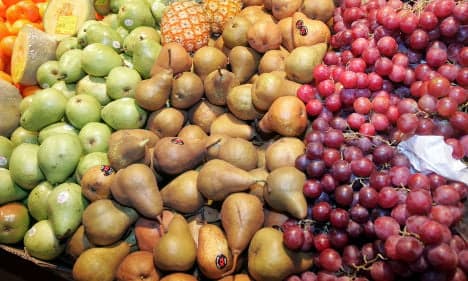'Dangerous' pesticides discovered in Swedish food

Chemicals banned by the EU have ended up in food sold in Sweden, an investigation for a new book, Miljödieten (The Environmental Diet), in collaboration with Sveriges Radio show Ekot has revealed.
The researchers announced on Tuesday that 22 of the world's most dangerous pesticides had ended up in foods sold in the Nordic nation in recent years.
They said that Sweden's national food agency, Livsmedelsverket, had found traces of the banned chemicals, but had not raised the alarm because the levels discovered did not exceed the agency's agreed limits.
However other experts speaking to Miljödieten said that the illegal pesticides were dangerous even in tiny quantities, with some of them even able to interfere with hormones and affect fertility.
"It's not only the amount of exposure that's relevant, but also when one is exposed to these substances," explained Peter Bergkvist, from Sweden's national chemicals agency (Kemikalieinspektionen).
"It's really new knowledge, we are learning more and more about these kinds of effects," he added.
According to Miljödieten, the banned pesticides found in Sweden were mainly discovered in food imported from outside the European Union. However some vegetables grown on European soil were also affected, including oranges from Spain, apples from Belgium, grapes from Greece and cucumbers from the Netherlands.
Livmedelsverket admitted to the book's researchers that banned chemicals had been discovered in around 150 cases in the last five years, but the agency insisted it was working hard to reduce exposure to dangerous substances in Sweden.
"The number of incidents that contain such high levels that they are harmful to us humans is declining," said Petra Fohgelberg, a leading food inspector.
"If we focus on the exceeding of thresholds, the number has fallen dramatically since 2009 – there has been a clear downwards trend."
However Bergkvist told the book's researchers that he would like to see Sweden's food agency revising its thresholds and working more closely with countries known to have exported products containing the banned substances.
Comments
See Also
The researchers announced on Tuesday that 22 of the world's most dangerous pesticides had ended up in foods sold in the Nordic nation in recent years.
They said that Sweden's national food agency, Livsmedelsverket, had found traces of the banned chemicals, but had not raised the alarm because the levels discovered did not exceed the agency's agreed limits.
However other experts speaking to Miljödieten said that the illegal pesticides were dangerous even in tiny quantities, with some of them even able to interfere with hormones and affect fertility.
"It's not only the amount of exposure that's relevant, but also when one is exposed to these substances," explained Peter Bergkvist, from Sweden's national chemicals agency (Kemikalieinspektionen).
"It's really new knowledge, we are learning more and more about these kinds of effects," he added.
According to Miljödieten, the banned pesticides found in Sweden were mainly discovered in food imported from outside the European Union. However some vegetables grown on European soil were also affected, including oranges from Spain, apples from Belgium, grapes from Greece and cucumbers from the Netherlands.
Livmedelsverket admitted to the book's researchers that banned chemicals had been discovered in around 150 cases in the last five years, but the agency insisted it was working hard to reduce exposure to dangerous substances in Sweden.
"The number of incidents that contain such high levels that they are harmful to us humans is declining," said Petra Fohgelberg, a leading food inspector.
"If we focus on the exceeding of thresholds, the number has fallen dramatically since 2009 – there has been a clear downwards trend."
However Bergkvist told the book's researchers that he would like to see Sweden's food agency revising its thresholds and working more closely with countries known to have exported products containing the banned substances.
Join the conversation in our comments section below. Share your own views and experience and if you have a question or suggestion for our journalists then email us at [email protected].
Please keep comments civil, constructive and on topic – and make sure to read our terms of use before getting involved.
Please log in here to leave a comment.